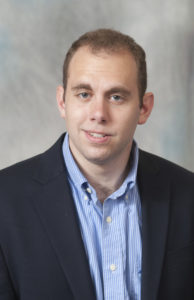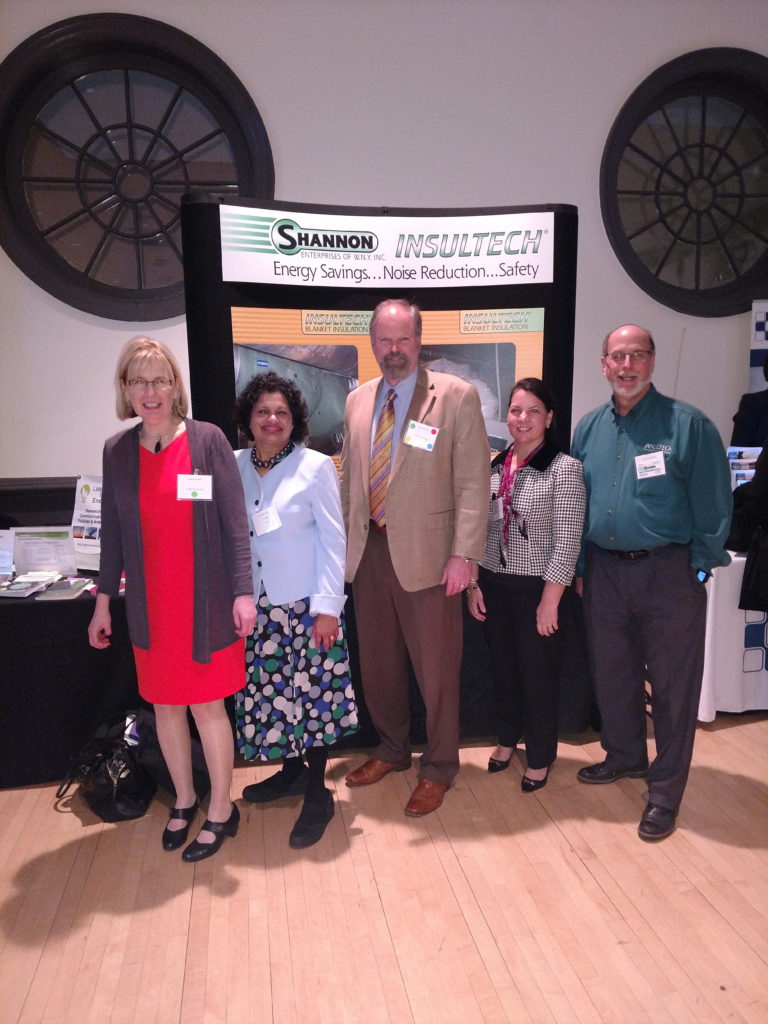 By RYAN BLOCK
By RYAN BLOCK
At the fourth annual Energy and Sustainability Extravaganza at the University of Maryland, College Park (UMD) on February 23, 2018, attendees learned about the types of services and products offered by private sector companies to promote sustainability.
Moderated Dr. Lynn Abramson, Executive Director of the Clean Energy Business Network (CEBN), there were two panels featuring representatives from a total of eight companies. Dr. Abramson introduced her organization, which has over 3,000 business leader members located in every state. CEBN has a focus on policy, education, and business networking. Dr. Abramson highlighted that U.S. economic growth has increased by 15% over the past ten years, with a 2% decrease in energy consumption.
The first panel featured green building solutions, and the second panel covered clean power and transportation solutions. Find more about the panels here.

1. Laurie Vandreuil, CEO of Mosaic Power:
They provide a grid balancing service through the use of a Water Heater Efficiency Network (WHEN) that optimizes the timing of energy usage among a network of electric water heaters. The program synchronizes electricity demand via connected water heaters with needs of the electric grid. As a result, Mosaic Power turns water heaters into batteries to provide a load-balancing service. This service helps to integrate renewable energy from solar and wind, because these sources of electricity are intermittent and tend to be produced before peak demand. One of the benefits of the company’s service is that they are able to install their technology in apartment buildings to help fund affordable housing. The company ultimately generates new revenue for housing providers while providing cleaner, more reliable energy to the grid.
2. Keith Derrington, Chief Operating Officer of Recurrent Innovative Solutions
Recurrent provides three main types of services: Building Informatics, Building Performance, and Building Systems and Services. Recurrent has three project objectives: to reduce operating expenses, improve tenant comfort, and to leverage funding. The benefits include lower utility costs, reduced maintenance and repair costs, onsite power production, better temperature control, improved system and improved system reliability.
3. Mike Makofsky, Northeast Regional Manager of Shannon Enterprises
Shannon Enterprises is the largest manufacturer of utility insulation products such as blanket insulation and insulation jackets, which can be removed and reused. The company’s insulation blankets were found to save millions of British Thermal Units of energy per hour, eliminate material and labor costs for utility companies, and last for decades. The blankets lower ambient air temperatures by approximately 200 degrees Fahrenheit, with the added benefit of providing workers with a safer environment to operate.
4. Tom Horner, Vice President of Engineering at Water Management
His company started in 1980 with shower heads and aeraters. After retrofitting a customer’s house, they found that the house continued to experience excessive water waste (by no fault of the newly installed technology). The issue was that the home had leakages in the toilets that were not diagnosed by the water meter. Nearly 98% of water devices fail because there is always a leak somewhere in the system. In response to this problem, Water Management found an opportunity to innovate in the process of auditing water usage. Water Management’s water auditing meter runs every five minutes once it is installed so that a problem can be immediately diagnosed and repaired.
This is a significant technology because the costs of water and sewage services rise two to three times the rate of inflation every year. When auditing water, the company asks where the water goes, how much water is lost due to leakages, where the water consumption occurs, and how to create a water balance. After these questions are answered, the company develops a strong measurement and verification protocol. By reducing water waste, the company is increasing the efficiency of water consumption and reducing the needs for new sources of water, such as new dams, river sharing, rainwater harvesting, desalination, and icebergs. Today, the company has installed 1.2 million meters in residential homes.
—
Beginning the Clean Power and Transportation Solutions panel, Dr. Abramson illustrated how our grid’s use of energy resources has changed over the last decade. She notes that the share of generation for renewables (including hydroelectric) have grown by 92%, while natural gas grew by 46%, nuclear expanded by 2%, and coal has declined by 38%. Lithium-ion batteries have also become cheaper over the last five years, with a total cost reduction of $390/KWh, a 65% decrease. These two changes together have enabled transformations in the energy and transportation sectors.
1. Jim Nagle, Vice President of Market Development and Sales at Edison Energy
Edison Energy focuses on Virtual Energy Management to increase the energy efficiency of buildings through the use of predictive management and costs associated with failing to address a performance issue. Edison Energy takes an enterprise view of organizations and tailors solutions that help to lower costs, create consistency and facilitate turning energy into value. They use a four-part master plan to reduce energy waste: pinpoint the options, analyze the risks, prioritize the alternatives, and then lay out the steps most relevant to creating value for their customers. By using centralized energy efficiency data on a single screen with real-time diagnostics and analysis, Edison Energy provides a monitoring and evaluation service to their clientele.
2. Joanne Ivancic, executive director of Advanced Biofuels USA
Advanced Biofuels USA is a 501(C)(3) nonprofit started in April 2008 that advocates for the use of advanced biofuels to promote energy security, military flexibility, economic development, climate change mitigation, and pollution control. Biofuels include ethanol, biodiesel, renewable diesel, biojet, biobutanol, drop-in hydrocarbons, heating oil, and cooking fuel. Feedstocks that produce advanced biofuels include, but are not limited to, algae, corn stovers, corn cobs, energy canes, sorghum, forestry waste, municipal waste, sawdust, chicken manure, agricultural residues, coffee grounds, and paper/pulp mill waste.
3. Cynthia Maves, the Electric Vehicle (EV) Business Development Manager at Nissan North America
Nissan has sold over 300,000 EVs worldwide, and the Leaf was first type of EV sold nationwide. The Leaf runs completely on electricity, and there have been zero incidents with the battery. The Leaf has a 40 KWh battery, which is the best in the industry and allows the vehicle to travel for longer distances (over 100 miles) on a single charge. After the battery becomes unsuitable for the automobiles, Nissan recycles the batteries. The batteries are can be reused by utilities as secondary storage units to provide backup power during times of shortages to make the electricity grid more secure and resilient.
The Leaf also incorporates new technology, such as standard automatic emergency braking, an E-pedal mode with 1 pedal driving to reduce driver fatigue, and proPILOT Assist to provide stress relief in stop and go traffic. Due to advances in lithium-ion battery technology, the Leaf’s prices dropped between 2017 and 2018, enabling the vehicle to better compete against conventional internal combustion engines that cost between $15,000 and $30,000. The Nissan Leaf received the Kelly Blue Book Value 2018 Award for having the lowest 5-year cost to own in EV category and the 2018 CES Best of Innovation Award for vehicle intelligence and self-driving technology.
4. Courtney Jenkins, Sales Coordinator and Project Finance for Standard Solar
Standard Solar was founded in 2004, and it is headquartered in Rockville, Maryland with offices in California, Florida, New Jersey, South Carolina, and Texas. The company was named by Inc. 5000 as one of the fastest-growing private companies in America for four consecutive years. The company has achieved over 1,500 photovoltaic installations around the country. In addition to installations, the company provides support in solar array design, engineering, financing, and maintenance. There are applications across the commercial space, and solar can be generated by ground mounts, parking structures (canopies), and roof mounts. The biggest system installed by Standard Solar is located in New Mexico (approximately 10 MW).
Ryan Block is a second-year Master of Public Policy student at the UMD School of Public Policy, specializing in energy and environmental policy. He is currently researching state renewable energy portfolio standards as a tool for decarbonization, modernizing the energy grid, and expanding renewable energy. Ryan aspires to attend law school to form a career that would combine law and policy analysis in the energy and environmental sectors.
Photo courtesy of Shannon Enterprises.


Leave a Reply